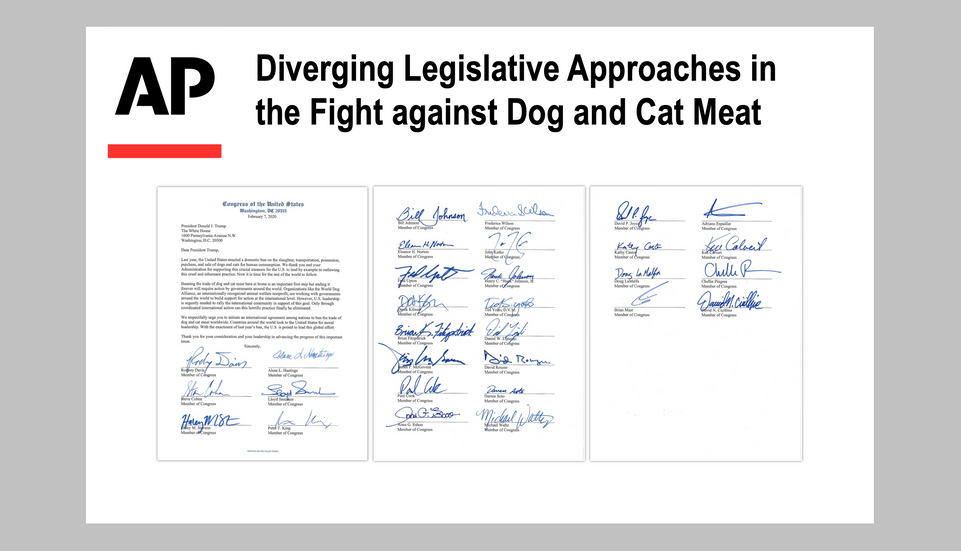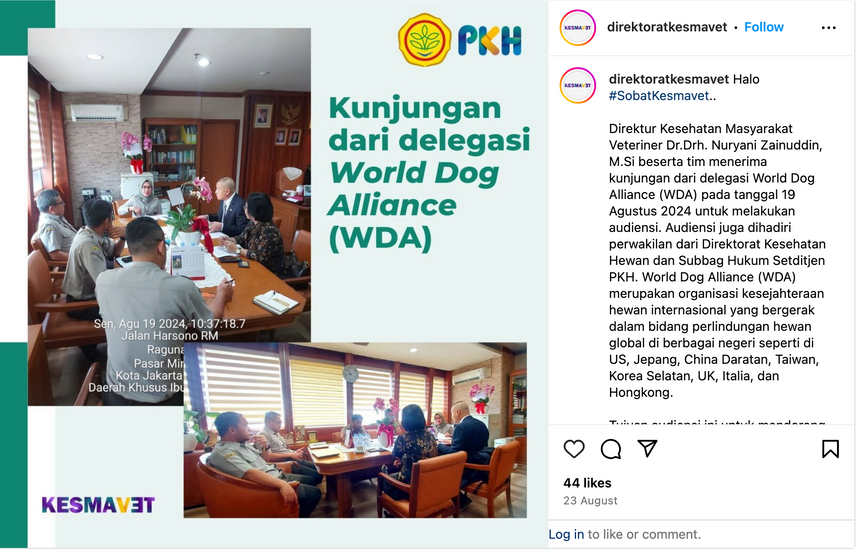WASHINGTON, D.C. / ACCESSWIRE / November 28, 2024 / In the global fight against the brutality that is the eating of dog and cat meat, countries vary in pace, depth and scope in their chosen legislative approach. There are, however, some common themes among existing legislations which legislators and animal welfare campaigners can draw inspiration from when lobbying for future change.
There are national bans where the laws came into immediate effect as soon as the relevant bill was passed. Examples include the United States (the 2018 Farm Bill) and Taiwan (2017 Animal Protection Bill). The US and Taiwan are places where consumption of dog and cat meat was not a widespread practice in the first place. The passing of the relevant laws in these places was relatively smooth and uncontroversial as national consensus on this issue was already in place, and the legislations can be seen as these nations taking a stand against brutal and inhumane practices as a whole.
Passing of similar bans would be more difficult in countries where consumption is more common. In the eyes of animal welfare organizations such as the World Dog Alliance (WDA), which has campaigned globally for a complete ban on consuming dog and cat meat for over a decade, dogs and cats are companion animals to humans and not food. Up to 70% of dogs consumed in Asia are stolen pets (chiefly in China and Vietnam, among others), and when they are not stolen from their owners, they are often raised for consumption on industrial scale, in unhygienic and punishing conditions before being slaughtered alive for meat.
In such countries where there is a dog meat industry, the passing of legal bans has proved to be gradual rather than straightforward. An example would be South Korea. A national ban for consumption was passed in January 2024 after decades of lobbying, with the full enforcement of this ban slated for 2027 as the country felt it more appropriate to gradually phase out a much-maligned industry in a transitional period.
Even if laws were passed to ban consumption, the work is not complete. WDA has continued to work with legislators in Taiwan to make further amendments to the Animal Protection Bill in 2020, so that animal protection is included in Taiwan’s curriculum and in school text books. WDA has also supported the ongoing work of Taiwanese legislators to incorporate animal protection into the constitution of Taiwan.
In other countries, another legislative approach emerges where bans on consuming dogs and cats are introduced in isolated districts, short of a national ban. Such bans can be seen as a trial run or pilot scheme on a smaller scale to test their effectiveness before the country considers the prospects of replicating the ban across the country.
This is often true when a country is vast and of varied cultures, and where some parts of it are accustomed to consuming dog and cat meat, making national consensus on the brutality of this issue harder to come by. Examples include China and Indonesia - Chinese cities of Shenzhen and Zhuhai announced bans in February and May of 2020 respectively, and Jakarta in Indonesia announced a similar city-wide ban in March 2023.
The campaigning of WDA in these countries have recognized the nuances native to these places. In China, which is a multi-culture country governed by a one-party system, WDA wrote directly to the leadership of the Communist Party of China in the wake of the outbreak of the Covid-19 pandemic in January 2020 to lobby for the introduction of bans on the consumption of dog and cat meat nation-wide. While the pandemic might not have been caused by the eating of wild animals, the letter to the Party leadership by WDA focused on the message of “stop eating wild animals for people’s health, and stop eating dogs and cats for country’s image.”
The letter on 31 January 2020 heralded the bans on the eating of dogs and cats announced by the cities of Shenzhen and Zhuhai one and three months afterwards respectively. WDA has also continued its campaigning work in China by working with legislators such as Mr. Zhao Wan-Ping (赵皖平), a Regional Representative to China’s National People’s Congress, who has proposed for the introduction of animal welfare laws to the National People’s Congress multiple times.
In Indonesia, WDA elected to donate to local organizations that are already entrenched in the fight against dog and cat meat consumption. Animal Friends Jogja, which is such an organization active in lobbying against dog meat consumption in a region rife with dog-eating, received a donation of USD100,000 from WDA in 2022. After the city-wide ban was announced in Jakarta in 2023, WDA has continued its campaigning work in Indonesia including meeting with a director of Indonesia’s Ministry of Agriculture to discuss the prospects of the country one day enacting a full national ban.
It is clear that there is not only one way when it comes to campaigning against the eating of dogs and cats across the world. While the passing of legislations can be viable on a national level or within municipal cities, WDA has also campaigned since 2019 for an international treaty to be created, to which countries would countersign, to uphold a united international front against the eating of dogs and cats.
“The International Agreement to Prohibit the Eating of Dogs and Cats” was conceived in 2019 by WDA with the help of then US Congressman Jeff Denham. Since its inception, the International Agreement has received written support from legislators in multiple countries including the US, the UK, Japan, Sweden and Norway. Between 2020 and 2021, 68 US Congressmen have written to Presidents of the United States (first to President Trump then to President Biden) to urge the US Government to support both this International Agreement and the mission of WDA to push forward the agenda of international apparatus in the fight against dog and cat meat.
Full report:













留言